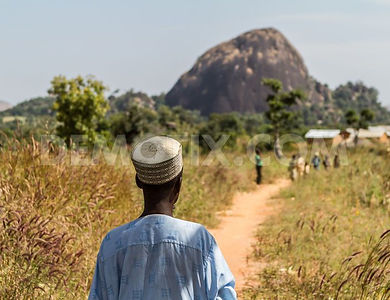
Life in Northern Nigeria
Physical environment
-
Northern Nigeria has a very dry region. In the dry season, during the six-month, very little rain falls. Women have to walk for miles each day to get water. Some rivers dry up completely, and lakes shrinks so bad, that a 5-mile walk for water in the wet season can become a 10-mile walk in the dry season.
-
Much of Northern Nigeria has high flat plains. In the high part of this plains if the Jos Plateau. Many people live and farm on this high ground because the weather is cooler and is wetter than on the plains below.
-
Lake Chad is an important source of water for many people in the region, but for the last 40 years the lake has been shrinking.
-
In the 1960 lake chad covered 4,000 square miles on its driest seasons, but by the year 2000, as a result of drought and the increased use of its water for irrigation, the lake was less than 1/10 that size.

Culture
Since roofs in the city are flat, in hot nights people sometimes sleep outside on their roofs.
In the country, people build round homes out of mud and cover them with roofs woven from palm leaves, this material provides good shelter from the sun.
Northern Nigerians have cloth that protects them from the sun. Men wear baggy cotton pants and florr-lenght robes, with the fron of the robes embroided. Also wear a Arab-hat called a fez. Women also wear robes that cover the entire body.
Some women use a cloth headdress. They wear a Hijab, that covers the hair and neck, and some also wear a velt that hides most of the face.
Economy
Many Northern Nigerians live as farmers of herders. Hausa farmers grow crops such as corn and millet wich is a kind of grain. These farmers eat some of the crops that they produce, and sell the rest in local village markets.
Fulani herders make their living by selling milk or products that are made from milk, such as butter to villagers. They rarely kill cows to sell as meat.
The Hausa have traditionally made beautiful cloth and leather goods. People once traveled from all over Africa to buy Hausa crafts. Some Hausa also work as traders and merchants, selling traditional crafts and factory-made goods to local people and tourist.
Ethnic Groups
The two largest ethnic groups in Northern Nigeria are the Hausa and the Fulani. The Hausa came to this region about 1,000 years ago, creating villages that later became an important trading centers and later into kingdoms. During the 1200, the Fulani also began to settle in the Northern Nigeria.
Over time, people from both ethnic groups married and created a connected culture. A difference is that about a third of Nigerians speak the Hausa lenguage, but the Fulani speack fulfude, a less common lenguage. The two ethnic groups also differ in where they live. The Hausa people tend to be more urban, and the Fulani people still live in rural areas. During the rainy season, the Fulani live in villages and plant crops.
The Hausa and the Fulani are united by their faith because both are Muslim. However many ethnic groups in Nigeria are christians. The conflicts between Muslims and Christians has increased in recent years. One of the reasons is that some states have choosen to make traditional islamic laws the basis of their legal system. These laws cover many aspects of dayly life like marriage or divorse.